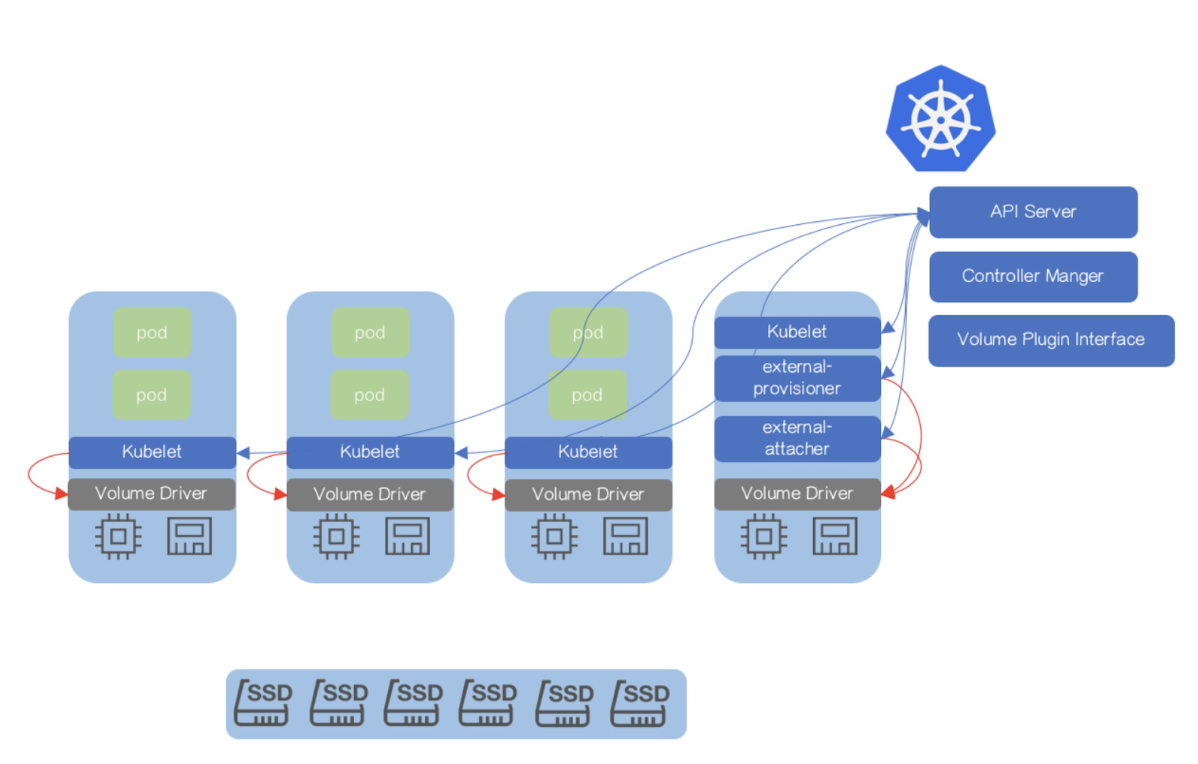CSI
CSI is the abbreviation of Container Storage Interface. To have a better understanding of what we're going to do, the first thing we need to know is what the Container Storage Interface is. Currently, there are still some problems for already existing storage subsystem within Kubernetes. Storage driver code is maintained in the Kubernetes core repository which is difficult to test. But beyond that, Kubernetes needs to give permissions to storage vendors to check code into the Kubernetes core repository. Ideally, that should be implemented externally.
CSI is designed to define an industry standard that will enable storage providers who enable CSI to be available across container orchestration systems that support CSI.
The figure below shows a kind of high-level Kubernetes archetypes integrated with CSI.

- Three new external components are introduced to decouple Kubernetes and Storage Provider logic
- Blue arrows present the conventional way to call against API Server
- Red arrows present gRPC to call against Volume Driver
Extend CSI and Kubernetes
In order to enable the feature of expanding volume atop Kubernetes, we should extend several components including CSI specification, “in-tree” volume plugin, external-provisioner and external-attacher.
Extend CSI spec
The feature of expanding volume is still undefined in latest CSI 0.2.0. The new 3 RPCs,
including RequiresFSResize, ControllerResizeVolume and NodeResizeVolume, should be introduced.
service Controller {
rpc CreateVolume (CreateVolumeRequest)
returns (CreateVolumeResponse) {}
……
rpc RequiresFSResize (RequiresFSResizeRequest)
returns (RequiresFSResizeResponse) {}
rpc ControllerResizeVolume (ControllerResizeVolumeRequest)
returns (ControllerResizeVolumeResponse) {}
}
service Node {
rpc NodeStageVolume (NodeStageVolumeRequest)
returns (NodeStageVolumeResponse) {}
……
rpc NodeResizeVolume (NodeResizeVolumeRequest)
returns (NodeResizeVolumeResponse) {}
}
Extend “In-Tree” Volume Plugin
In addition to the extend CSI specification, the csiPlugin interface within Kubernetes
should also implement expandablePlugin. The csiPlugin interface will expand
PersistentVolumeClaim representing for ExpanderController.
type ExpandableVolumePlugin interface {
VolumePlugin
ExpandVolumeDevice(spec Spec, newSize resource.Quantity, oldSize resource.Quantity) (resource.Quantity, error)
RequiresFSResize() bool
}
Implement Volume Driver
Finally, to abstract complexity of the implementation, we should hard code the separate storage provider management logic into the following functions which is well-defined in the CSI specification:
- CreateVolume
- DeleteVolume
- ControllerPublishVolume
- ControllerUnpublishVolume
- ValidateVolumeCapabilities
- ListVolumes
- GetCapacity
- ControllerGetCapabilities
- RequiresFSResize
- ControllerResizeVolume
Demonstration
Let’s demonstrate this feature with a concrete user case.
Create storage class for CSI storage provisioner
allowVolumeExpansion: true
apiVersion: storage.k8s.io/v1
kind: StorageClass
metadata:
name: csi-qcfs
parameters:
csiProvisionerSecretName: orain-test
csiProvisionerSecretNamespace: default
provisioner: csi-qcfsplugin
reclaimPolicy: Delete
volumeBindingMode: ImmediateDeploy CSI Volume Driver including storage provisioner
csi-qcfspluginacross Kubernetes clusterCreate PVC
qcfs-pvcwhich will be dynamically provisioned by storage classcsi-qcfsapiVersion: v1
kind: PersistentVolumeClaim
metadata:
name: qcfs-pvc
namespace: default
....
accessModes:
- ReadWriteOnce
resources:
requests:
storage: 300Gi
storageClassName: csi-qcfsCreate MySQL 5.7 instance to use PVC
qcfs-pvcIn order to mirror the exact same production-level scenario, there are actually two different types of workloads including:
- Batch insert to make MySQL consuming more file system capacity
- Surge query request
Dynamically expand volume capacity through edit pvc
qcfs-pvcconfiguration